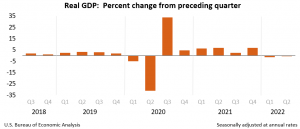U.S. economy shrank two quarters in a row, the Bureau of Economic Analysis (BEA) reports in a new estimate.
The BEA, an agency of the U.S. Department of Commerce, states:
“Real gross domestic product (GDP) decreased at an annual rate of 0.6 percent in the second quarter of 2022 (table 1), according to the “second” estimate released by the Bureau of Economic Analysis. In the first quarter, real GDP decreased 1.6 percent.
“The GDP estimate released today is based on more complete source data than were available for the “advance” estimate issued last month. In the advance estimate, the decrease in real GDP was 0.9 percent. The update primarily reflects upward revisions to consumer spending and private inventory investment that were partly offset by a downward revision to residential fixed investment (refer to “Updates to GDP”).”

“Current‑dollar GDP increased 8.4 percent at an annual rate, or $496.2 billion, in the second quarter to a level of $24.88 trillion,” states the BEA. “The price index for gross domestic purchases increased 8.4 percent in the second quarter. …”
The BEA will issue its final estimate for the second quarter of 2022 in September, and begin releasing estimates for the third quarter in the following months.
Worse economic news is expected in future months, says Forbes writer Jonathan Ponciano.
“Economists predict signs of a slowdown will only grow in the coming quarters, likely prompting the government to officially declare the economy has entered a recession,” said Ponciano.
Wells Fargo senior economist Tim Quinlan says we may not be in an official recession yet, but key economic indicators are falling, according to Ponciano.
“Quinlan isn’t convinced economic indicators last quarter were indicative of a current recession, but he warns the economy is slowing and ‘it is starting to feel like [entering one] is only a matter of time,'” writes Ponciano.
Recessions are “officially” called by the Business Cycle Dating Committee of the nongovernmental National Bureau of Economic Research (NBER), based on objective factors. However, the NBER’s final determinations of recessions are published many months after the fact, as they wait for data.
For more Budget & Tax News.











